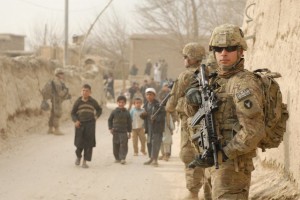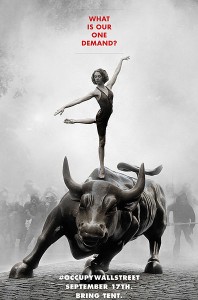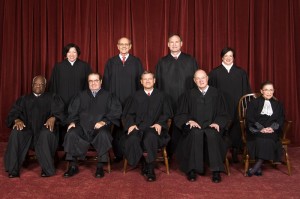Peace and Nonviolence
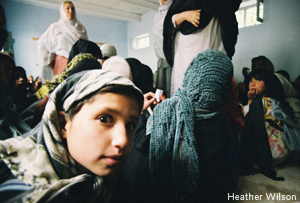
During interviews with more than a dozen Afghan women leaders, researchers, international aid workers and former Afghan government officials, we learned of persistent dangers and threats to the country's future.
Afghan women face continuing repression. They are witnessing the erosion of previous gains as Taliban control spreads in the countryside and reactionary warlord influence increases within the Kabul regime. The government's own security forces are often responsible for violations of women's rights. Check back in a few days for a more detailed account of what we learned.
The withdrawal of foreign forces will produce an economic crisis for the government of Afghanistan, which remains almost completely dependent financially on the U.S. and other foreign governments, especially to pay for its huge 300,000-person security forces. I wrote about this funding failure in an earlier post.
A new security agreement between Kabul and Washington is likely to call for the continued presence of U.S. military forces in the country beyond the 2014 transition deadline. This is seen as necessary to provide security for Kabul, but it could also have the effect of prolonging the insurgency and impeding prospects for reconciliation.
It was clear from what we heard that maintaining security requires more than deploying a large number of troops.

The 10-year pop culture love affair with Harry Potter leaves questions at the crux.
The condition of former U.S. Marine and Iraq War veteran Scott Olsen, 24, who was badly injured when he was struck in the head reportedly by a projectile fired by police Tuesday night during Occupy Wall Street protests in Oakland, Calif., was upgraded from critical to fair condition overnight.
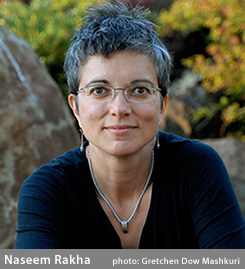
Naseem Rakha, author of the 2009 novel The Crying Tree sees justice differently. Rakha, an award-winning journalist whose work has been featured on National Public Radio and elsewhere, has covered two death penalty cases in Oregon -- the only two in that state's history -- and has spent considerable time exploring the deeper story behind capital punishment, retributive justice and forgiveness.
"What I learned from talking to these victims is that there is a place, not called closure, not called moving on, but there is a place of empowerment," Rakha said in a recent interview with God's Politics. "Crime strips people of power, and there's nothing that the justice system or really even churches can give to you to replace that power. It is an act of wanting to sit down and meet with the person who strips that power from you that has transformed people's lives and gotten them to a point where they can forgive the act, because they see the perpetrator no longer as a monster, but as a human that has made a terrible mistake."
On the crest of that hill, mourning the violence Kabul had suffered, I stumbled upon a patch of vibrant wild tulips growing at my feet, and was reminded that, even in this place of bloodshed, beauty and life returns.
Today, may we remember the life, hope, and courage that remains in Afghanistan.
The new movement called Occupy Wall Street now has spread across the country, from the very seats of our political and financial power and our largest cities, to suburbs and small towns. In some communities small groups of a few dozen have formed and in some cities thousands have gathered.
In each instance, no matter the size, people's frustrations, hurt and feelings of being betrayed by our nation's politicians and economic leaders are clear and they want to be heard.
We will likely see images and hear things that will offend us and some that will inspire.
We'll hear demands that we agree with and some that we don't.
And that's OK.
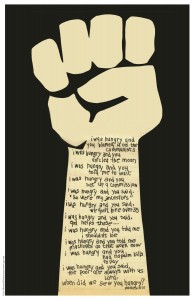 This poster originally appeared in the inaugural issue of The Post-American magazine in the fall of 1971. The Post-American was the original name of Sojourners Magazine. The name was changed to Sojourners when the intentional community that founded the Sojourners organization relocated from Chicago to Washington, D.C., in 1975.Sojourners
This poster originally appeared in the inaugural issue of The Post-American magazine in the fall of 1971. The Post-American was the original name of Sojourners Magazine. The name was changed to Sojourners when the intentional community that founded the Sojourners organization relocated from Chicago to Washington, D.C., in 1975.Sojourners
The text of the poster is based on Jesus' own words in Matthew 25:37.
They are words and ideas that are as relevant and revolutionary today as they were when Jesus first uttered them more than 2,000 years ago.
(+Video may contain coarse language+)
Indie music darling, Jeff Mangum, who rarely plays in public, surprised #OccupyWallStreet protesters in New York City earlier this week with an impromptu concert. A New Jersey singer-songwriter pens two songs for revolutions. And an order of Catholic nuns offer free mp3 downloads of a protest song inspired by the life of St. Francis of Assisi.
 Just a few days after I returned from my respite in the mountains, Israeli forces killed eight Turkish nationals and one American on a Gaza-bound aid flotilla. Protests erupted all over Israel and Palestine.
Just a few days after I returned from my respite in the mountains, Israeli forces killed eight Turkish nationals and one American on a Gaza-bound aid flotilla. Protests erupted all over Israel and Palestine.
In the midst of this tragic chaos I found myself visiting my yoga center more often than usual, hoping to find another glimpse of the peace I had tasted so vividly just a few days before. Perhaps these wise, centered people could offer a perspective that would look forward to a vision of understanding, or reconciliation -- a vision too often missed by politicians, military officials, media, and even activists.
Let’s face it — while lawmakers are picking their own battles in Washington, they aren’t fighting on the ground in Afghanistan. Winning elections has become more important than implementing winning foreign policy strategies that would end the war and bring our service men and women safely home.
And it’s my generation that’s being sacrificed.
From the official statement by #OccupyWallStreet: "As one people, united, we acknowledge the reality: that the future of the human race requires the cooperation of its members; that our system must protect our rights, and upon corruption of that system, it is up to the individuals to protect their own rights, and those of their neighbors; that a democratic government derives its just power from the people, but corporations do not seek consent to extract wealth from the people and the Earth; and that no true democracy is attainable when the process is determined by economic power."
A truck bomb has killed at least 70 people in the Somali capital of Mogadishu, including a crowd of young students applying for scholarships to study abroad.
This Friday, October 7, 2011, marks 10 years since the United States invaded Afghanistan in the name of the "War on Terror." Sadly, this summer President Obama announced he'll continue our military presence in the country until 2014, and Congress has agreed to follow his lead.
Where do we go from here?
The U.S. Supreme Court is set to begin hearing oral arguments this week in one of the most important church-state cases in decades. In Hosanna-Tabor Church v. Equal Employment Opportunity Commission, the court will consider whether a Lutheran school in Michigan is subject to a federal law banning discrimination based on a disability.
What's more obscene? Thirty-thousand children dead in Somalia in three months? Or the world standing by and letting it happen?
UPDATES: Earlier today (Friday, Sept. 30), the Iranian Embassy in the U.K. issued the following statement regarding Pastor Nadarkhani:

